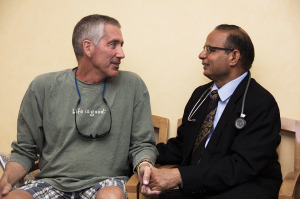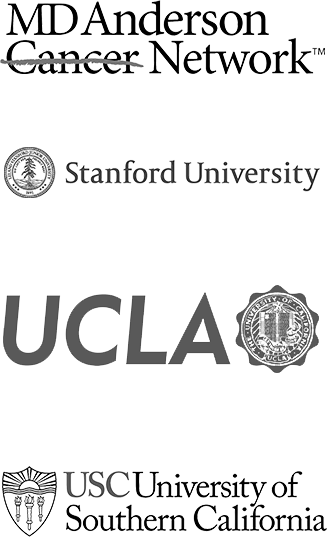Lung Carcinoma Chemotherapy
Chemotherapy is one of the most effective treatment options available for many forms of cancer. At the Cancer Center of Southern California, board-certified oncologist Dr. Sant Chawla and the oncology team use several methods to treat lung cancer, depending on the stage and progression of the disease in each patient.

Chemotherapy for lung carcinoma is often used in combination with several chemotherapy drugs for a stronger and more targeted attack on tumors, as will as with other types of treatment such as radiation and surgery.
Lung Carcinoma Chemotherapy
When to administer chemotherapy in the treatment cycle usually depends on several factors, such as the stage, location, and whether surgery to remove the tumors might be a treatment option. For some lung carcinoma cases, chemotherapy can be applied first in order to attempt to shrink the tumors before surgery, or it may be administered after surgery to eliminate any potential remaining cancer cells and to help lessen the likelihood of recurrence.
Some of the most common chemotherapy drugs used to help treat lung cancer include:
- Platinol (cisplatin)
- Paraplatin (carboplatin)
- Taxotere (docetaxel)
- Gemzar (gemcitabine)
- Taxol (paclitaxel)
- Navelbine (vinorelbine)
- Alimta (pemetrexed)
At the Cancer Center of Southern California, Dr. Chawla and the oncology team regularly conduct clinical trials to find new and more effective chemotherapy and other treatments for pulmonary carcinomas. Different chemotherapy drugs may be combined at varying doses throughout the course of treatment in order to find the combination that will be most effective in killing and shrinking cancer cells.
The success and outcome of chemotherapy protocols varies from patient to patient and case to case. For certain later stage cases, chemotherapy may be administered with the intent to help relieve symptoms and provide comfort (palliative treatment).
Some studies have shown that lung carcinoma patients are better able to handle some of the associated side effects of chemotherapy than patients in treatment for other forms of cancer. The effectiveness of a specific drug or combination of drugs can be measured by whether or not it leads to the shrinking of tumors. When a particular chemotherapy drug or combination of drugs does not manage to shrink the tumors, Dr. Chawla and the oncology team can discontinue the treatment and try a new drug or combination of drugs, as well as adjust dosages to find the combination that works the best.
What are the Side Effects of Chemotherapy Treatment for Lung Carcinoma?
- Vomiting
- Nausea
- Appetite loss
- Hair loss
- Sores inside the mouth and other parts of the body
- Constipation
- Diarrhea
- Low white blood cell count, which can in turn increase the risk and likelihood of infections
- Low platelets, which can result in bleeding and excessive bleeding
- Low red blood cell count, which can lead to exhaustion and fatigue
It can be difficult, if not impossible to predict how a patient will respond to a particular course of treatment. A particular chemotherapy drug or combination of drugs that proves successful in one patient may not yield the same or any measurable results in a different patient with tumors of a similar stage and grade.
Next, read Lung Cancer Surgery


